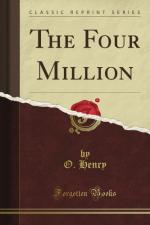“’Tis right ye are, ma’am; ’tis by renting rooms we kape alive. Ye have the rale sense for business, ma’am. There be many people will rayjict the rentin’ of a room if they be tould a suicide has been after dyin’ in the bed of it.”
“As you say, we has our living to be making,” remarked Mrs. Purdy.
“Yis, ma’am; ’tis true. ’Tis just one wake ago this day I helped ye lay out the third floor, back. A pretty slip of a colleen she was to be killin’ herself wid the gas—a swate little face she had, Mrs. Purdy, ma’am.”
“She’d a-been called handsome, as you say,” said Mrs. Purdy, assenting but critical, “but for that mole she had a-growin’ by her left eyebrow. Do fill up your glass again, Mrs. McCool.”
THE BRIEF DEBUT OF TILDY
If you do not know Bogle’s Chop House and Family Restaurant it is your loss. For if you are one of the fortunate ones who dine expensively you should be interested to know how the other half consumes provisions. And if you belong to the half to whom waiters’ checks are things of moment, you should know Bogle’s, for there you get your money’s worth—in quantity, at least.
Bogle’s is situated in that highway of bourgeoisie, that boulevard of Brown-Jones-and-Robinson, Eighth Avenue. There are two rows of tables in the room, six in each row. On each table is a caster-stand, containing cruets of condiments and seasons. From the pepper cruet you may shake a cloud of something tasteless and melancholy, like volcanic dust. From the salt cruet you may expect nothing. Though a man should extract a sanguinary stream from the pallid turnip, yet will his prowess be balked when he comes to wrest salt from Bogle’s cruets. Also upon each table stands the counterfeit of that benign sauce made “from the recipe of a nobleman in India.”
At the cashier’s desk sits Bogle, cold, sordid, slow, smouldering, and takes your money. Behind a mountain of toothpicks he makes your change, files your check, and ejects at you, like a toad, a word about the weather. Beyond a corroboration of his meteorological statement you would better not venture. You are not Bogle’s friend; you are a fed, transient customer, and you and he may not meet again until the blowing of Gabriel’s dinner horn. So take your change and go—to the devil if you like. There you have Bogle’s sentiments.
The needs of Bogle’s customers were supplied by two waitresses and a Voice. One of the waitresses was named Aileen. She was tall, beautiful, lively, gracious and learned in persiflage. Her other name? There was no more necessity for another name at Bogle’s than there was for finger-bowls.
The name of the other waitress was Tildy. Why do you suggest Matilda? Please listen this time—Tildy—Tildy. Tildy was dumpy, plain-faced, and too anxious to please to please. Repeat the last clause to yourself once or twice, and make the acquaintance of the duplicate infinite.




